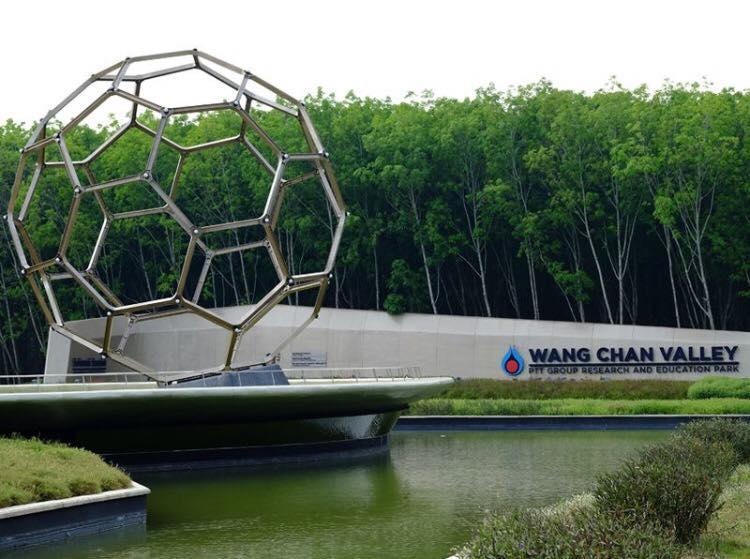
PTT Plc is set to launch its Eastern Economic Corridor of Innovation (EECI) project in Rayong with the ambitious goal to raise the research and development centre to technology readiness level soon.
The SET-listed national oil and gas conglomerate is developing the EECI in Rayong province's Wang Chan Valley.
The government plans for the EECI to occupy two sites, the other being in Sri Racha district of Chon Buri.
For Wang Chan Valley, the EECI site occupies a plot owned by PTT.
The location spans 3,140 rai, of which 1,000 rai is held by the Kamnoetvidya Science Academy (KVIS), the Vidyasirimedhi Institute of Science and Technology (VISTEC) and the Wangchan Reforestation Project, all run by PTT.
The remaining 2,140 rai will be developed by the Science and Technology Ministry and PTT.
Wittawat Svasti-Xuto, PTT's chief technology and engineering officer, said the project will avoid R&D activities that cannot be developed for commercial use.
Thailand has many R&D houses, both public and private, but few activities have been upgraded to be used for commercial purposes.
"As a result, Thailand has yet to reach the global standard -- the technology readiness level," Mr Wittawat said.
The standard is divided into 10 levels of research and technology, covering four stages: idea (levels 0 to 3), prototype (levels 4 and 5), validation (levels 6 and 7) and production (levels 8 and 9).
Mr Wittawat said hundreds of activities could be improved in the prototype system and be ready for the production level, so PTT has to reach this goal.
He said PTT has set up the PTT Accelerator Team to support new R&D activities by teaming up with 10 leading universities in the country.
"We have the goal to carry out all research and development activities to become 'dream come true' jobs," Mr Wittawat said.
Hongsri Charoenvaravoot, the EECI's project director, said PTT started to develop two educational institutions in 2015, KVIS (secondary school) and VISTEC (university), to produce manpower to meet the country's strategies.
PTT invested 10 billion baht in the two institutions.
"We have witnessed Rayong's Map Ta Phut develop from a drought-hit area to the region's petrochemical hub while creating new jobs and circulating money in the province," said Mrs Hongsri, also PTT's executive vice-president.

PTT's Research and Education Park in Wang Chan Valley.
The EECI will be the centre of the Thailand 4.0 initiative with the adoption of new technology and innovation.
"In the bigger picture, Thailand's research and development activities now reach the prototype level and we face the challenge of bringing all activities to meet level 9," Mrs Hongsri said.
PTT plans to develop a mixed-use property in the EECI as well, she said.
The project is developing basic infrastructure. PTT plans to issue terms of reference to develop the first phase of the EECI in the third quarter.
The winning developer will be granted a 30-year lease contract.
PTT budgeted 3 billion baht and PTT Exploration and Production Plc allocated 840 million baht for the EECI.
Two external agencies are also investing: the National Science and Technology Development Agency (1.2 billion baht) and the Synchrotron Light Research Institute (9.6 billion baht).
All infrastructure is expected become operational during 2020-22.
Mrs Hongsri said the EECI aims to be the most successful science park in the country.
In the past, many science parks operated by state agencies failed to reach the technology readiness level.
"Each unit in the EECI has to be connected with students, workers and residents, and no state-run science park has yet to meet these requirements," Mrs Hongsri said. "Developing career paths is one of the chief goals of the EECI, because PTT plans to create new science students and they will be guaranteed competitive jobs in Thailand."
She said new scientists from the EECI will not join Thailand's brain drain, unlike scientists and doctors who are now working in countries that offer good salaries and career development.
Moreover, PTT has signed agreements with many world-class companies to support the further development of the EECI, such as Huawei Technologies and GE Thailand.
"We welcome all companies and startups to enter the EECI, which is designed to be one of Thailand's smart cities in the future," Mrs Hongsri said.
Kris Imsang, PTT's senior executive vice-president, said the privately managed science park will be more competitive than state-run counterparts because decision-making will be more flexible.
"We have to make EECI an ecosystem for science majors for Thailand," Mr Kris said.
PTT has set up seven corporate venture capital funds to move forward and mobilise Thai startups.
The funds will support the development of robotics, artificial intelligence and electric vehicles.
"PTT will adopt the design and management of EECI from Grenoble in France, which has shifted from depending on heavy industry to being an innovation-based creative city," Mr Kris said. "Grenoble now hosts 25,000 researchers and 62,000 students."